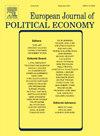把问题拖到以后再说?延迟财政整顿的实时数据分析
IF 2.4
3区 经济学
Q2 ECONOMICS
引用次数: 0
摘要
为什么一些国家在面临财政不可持续性时迅速采取行动,而另一些国家却迟迟不行动?本研究使用欧盟委员会年度政策报告中的实时数据,调查了2002年至2019年欧盟(EU)内部纠正不健全财政政策的惯性。结果表明,欧盟国家在其财政政策被欧共体标记为不可持续后,平均需要三年时间来制定调整计划。财政整顿计划时机的关键驱动因素包括国内产出缺口、选举、内阁规模和过度赤字程序(EDP)的启动。该分析提供了新的证据,证明欧洲经济政策的运作严重政治化:在欧洲大选年,在存在长期财政风险的国家,在较小的欧盟国家,以及相对于欧洲议会,国家政府更倾向于右倾的国家,其影响力往往会减弱。其他研究结果强调,忽视财政整顿的必要性可能会忽视导致此类政策延迟的关键因素,从而可能导致误导性的政策指导。本文章由计算机程序翻译,如有差异,请以英文原文为准。
Kicking the can down the road? A real-time data analysis of delayed fiscal consolidation
Why do some countries act swiftly when confronted with fiscal unsustainability, while others delay action? This study investigates the inertia in correcting unsound fiscal policy within the European Union (EU) from 2002 to 2019, using real-time data drawn from annual policy reports of the European Commission (EC). The results show that, on average, EU countries take three years to formulate adjustment plans after their fiscal policies are marked as unsustainable by the EC. Key drivers of the timing of fiscal consolidation plans include the domestic output gap, elections, cabinet size, and the activation of an Excessive Deficit Procedure (EDP). The analysis provides new evidence that the functioning of the EDP is heavily politicized: its influence tends to diminish during European election years, in countries with long-standing fiscal risks, in smaller EU countries, and where national governments lean more to the right relative to the European Parliament. Additional findings highlight that neglecting the need for fiscal consolidation may overlook key factors driving delays in such policies, potentially leading to misleading policy guidance.
求助全文
通过发布文献求助,成功后即可免费获取论文全文。
去求助
来源期刊

European Journal of Political Economy
Multiple-
CiteScore
3.40
自引率
10.00%
发文量
106
期刊介绍:
The aim of the European Journal of Political Economy is to disseminate original theoretical and empirical research on economic phenomena within a scope that encompasses collective decision making, political behavior, and the role of institutions. Contributions are invited from the international community of researchers. Manuscripts must be published in English. Starting 2008, the European Journal of Political Economy is indexed in the Social Sciences Citation Index published by Thomson Scientific (formerly ISI).
 求助内容:
求助内容: 应助结果提醒方式:
应助结果提醒方式:


